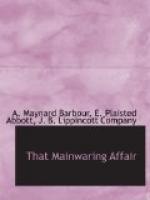“I have thought very often of you during these past weeks,” she continued, “and felt quite impatient to learn how you were progressing, and your note was so brief, you know. It left so much unsaid. I fear you forget how interested I am in all that concerns yourself.”
“No,” he replied, slowly, “I do not forget; and I appreciate your interest in me even though I may not seem to, — even though I am forced, as you say, to leave so much unsaid which I had hoped to say.”
Something in his manner, more than in what he said, thrilled her with a vague, undefinable sense of impending evil, and, during the slight pause which followed, she dreaded his next words, lest they should in some way confirm her apprehensions. He said nothing further, however, and when she spoke it was with an assumed lightness and cheerfulness which she was far from feeling.
“I hoped to have the pleasure of meeting you often ere this, and my uncle and cousin would have been so glad to welcome you to their home during your stay in London, but they have just gone out of town for a few days.”
“Ordinarily, Miss Carleton,” he replied, quietly, “I should be pleased to meet them, but on the present occasion, as I sail, to-morrow, I naturally care to see no one but yourself.”
“To-morrow!” she exclaimed, while her own cheek suddenly paled. “Do you return so soon?”
“Yes,” he replied, observing her emotion, and speaking rapidly to conceal his own feelings; “my business is at last completed. I have been detained longer than I expected, and I found the situation more complex than I anticipated, but I shall return well equipped for the battle.”
“And you will win, I am sure. Tell me something regarding your plans,” she added, with a wistful smile that touched her companion for more than he cared to betray.
“Mr. Alfred Barton goes with me to America,” he said, speaking cheerfully; “and we have already cabled instructions to Mr. Sutherland, my New York attorney, regarding the initiatory steps. Mr. Barton and myself will be accompanied by James Wilson, the old servant who witnessed the execution of the will,” — Miss Carleton’s eyes brightened, — “and also by a thoroughly competent, first-class Scotland Yard officer.”
She gave a low exclamation. “I see what a powerful witness old Wilson will make; but the detective, what will you do with him?”
“We are going to investigate the murder of Hugh Mainwaring,” he said, calmly.
“Why, surely, you cannot mean — " she hesitated. “You do not think that suspicion will be directed against any of the guests at Fair Oaks, do you?”
“My dear Miss Carleton, I cannot say at present. Perhaps,” he added, slowly, looking steadily into her eyes, “perhaps, when all is over, suspicion will be directed against myself so unmistakably that public opinion will pronounce me guilty.”
“I cannot believe that,” she cried; “and even were it so, — should the whole world pronounce you guilty, — I would still believe you innocent; and I think,” she added, quickly, “that is your object in employing a detective: by finding the real murderer, you will establish your own entire innocence.”




